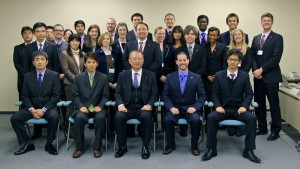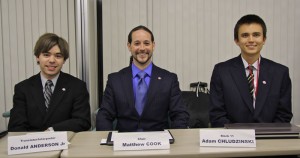Winter 2011 Opinion Exchange with CLAIR, MEXT, MOFA, and MIC
 Glad to see you all back here, perservering through winter in Japan!
Glad to see you all back here, perservering through winter in Japan!
Last year was arguably the biggest year in the JET Programme’s history. I personally was grateful to be a part of it, and honored to serve you all during it. We saw the 25th anniversary of JET itself in the same year that Japan was struck with disasters of historic proportion. With great determination, this country and we, as officially invited guests, stood strong in our dedication and determination to recovery.
I’d like to personally thank all of you across the country for the variety of projects, events, and fundraising that you contributed to Japan in the aftermath of the March 11th disasters. It was admirable, selfless, and made me proud to be your colleague!
As you may already know, AJET wrapped up 2011 with its bi-annual opinion exchange with CLAIR, MoFA, MEXT and MIC on December 12th and13th.
If you’re not familiar with how these meetings work, I’ll give you a quick run-down.
These meetings are very important to the successful administration of JET as a program. It’s also an official platform for AJET to gather the opinions and experiences of JETs, and share them with the ministries in hopes of running a Programme that is constantly getting better, and more effective in its purpose.
 First, AJET surveys JETs online, based on the issues that JETs tell us are important to them. We take the data collected from those surveys and use it to write research reports. After sending those to the ministries, we meet for two days with the ministries to discuss the results, ask questions, give suggestions and share opinions about what we’re doing and where we’d all like the JET Programme to go in the future.
First, AJET surveys JETs online, based on the issues that JETs tell us are important to them. We take the data collected from those surveys and use it to write research reports. After sending those to the ministries, we meet for two days with the ministries to discuss the results, ask questions, give suggestions and share opinions about what we’re doing and where we’d all like the JET Programme to go in the future.
This December, we discussed how Prefectural Advisors (PAs)view their roles and experiences with the system as PAs, how English education is being implemented and taught in elementary schools, and updated them on AJET’s work, activities and accomplishments this year.
This whole process is entirely fueled by JETs responses and views across this country. Because of that, I believe that AJET owes it to all of you to really convey what happened there, and let you know why these discussions were important.
On the first afternoon, Donny Anderson (AJET Translator) presented an excellent summary and powerpoint, in Japanese, on our report, “Foreign Language Activities at the Elementary School Level”. The findings of the report were directed toward the Ministry of Education and included suggestions and recommendations put forth by myself, Donny, and Adam Chludzinski (AJET Blcok 11 Representative) and interpreted by Donny Anderson. Those recommendations included ways that AJET could assist them by providing large scale solutions to problems that are within a system that’s dependent on local level administrators for decisions how to actually implement it’s ideas.
Afterward, Cailin Arena (Director of Public Relations) facilitated a discussion with the ministries regarding the “AJET General Activities” report. This report was a detailed breakdown of all the changes to our organizational structure since July. The purpose of this was to make AJET’s operations easy to understand for the ministries who support us, and reach out to them for financial and logistical assistance. We also included a detailed explanation of how AJET has begun to use social media to reach JETs across Japan, and a breakdown of our new business model.
Considering that AJET functions on a 100% independent basis (with no government budget), we rely on support from the Programme’s coordinators in many ways, not just financially. Ultimately, each organization was reminded of our common goals, and AJET was promised new support as well as the continuation of existing assistance.
 The next morning, Erica Nakanishi-Stanis (Volunteering and Aid Coordinator) gave a summary in Japanese on the “Peer Review of the PA System” report. Erica highlighted the four themes of the report, which were selection of PAs, how they are trained, how they view their roles, and their roles during the aftermath of the 3/11 disasters.
The next morning, Erica Nakanishi-Stanis (Volunteering and Aid Coordinator) gave a summary in Japanese on the “Peer Review of the PA System” report. Erica highlighted the four themes of the report, which were selection of PAs, how they are trained, how they view their roles, and their roles during the aftermath of the 3/11 disasters.
Following summary, Erica and Denise Schlickbernd (AJET CIR Representative) facilitated a dialogue with the ministries regarding their findings. As Erica and Denise are both PA’s, they were able to bring a very comprehensive and analytical approach to this report and discussion.
In the end, I was reminded just how important these meetings and our collaboration with the ministries are. Sometimes, we can see direct changes or start new endeavors right there in these meetings. Other times, this is just when a seed is planted. It’s important for us as a council and future councils to remember that even though we may not get the answer that JETs want right then and there, sometimes the effects of these conversations and exchanges of opinions come to fruition in the long run.
In the grand scheme of things, the five organizations who work together to coordinate the success of the JET Programme all have different roles in JET for different reasons. However, it is important to remember that proper collaboration results in one of the largest international exchange initiatives in the world that has, and continues to, touch the lives of millions both in and outside Japan.
I’ve left that meeting with a rejuvenated spirit carried through good tidings of spirit and celebration of the holidays and new year! This January, as I start the last 6 months of my 5 year JET career, I’m sure that this will be the most important and best yet! I hope you’ll join us and we get ready to make 2012 the year that won’t be forgotten, and starts a new chapter in the JET Programme History!
Connect with you next month,
Matthew Cook


 Follow
Follow
 Connect with me on LinkedIn
Connect with me on LinkedIn Follow me on Twitter
Follow me on Twitter Like me on Facebook
Like me on Facebook Read my RSS Feed
Read my RSS Feed
You must be logged in to post a comment.